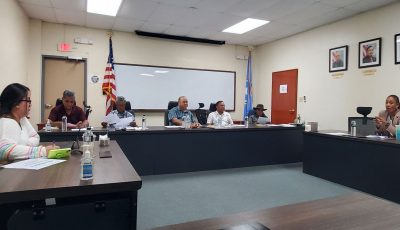Bill hikes CNMI’s share of any money recovered from IPI debtors since ’16
The Senate passed on first and final reading last week a bill that will increase the percentage of recovery for the CNMI government and the Office of the Attorney General for prosecuting gamblers who owe casino operator Imperial Pacific International (CNMI) LLC.
Introduced by Senate President Victor B. Hocog (R-Rota) and some other senators, all eight senators present at the session last Tuesday voted to pass Senate Bill 21-75. They were Sens.Teresita A. Santos (Ind-Rota), Paul A. Manglona (D-Rota), Sixto K. Igisomar (R-Saipan), Vinnie F. Sablan (Ind-Saipan), Jude U. Hofschneider (R-Tinian), Francisco M. Borja (R-Tinian), and Francisco Q. Cruz (R-Tinian). Sen. Justo S. Quitugua (R-Saipan) was excused from the session.
The bill increases the percentage of recovery, for the CNMI government and OAG for pursuing criminal action against an IPI debtor for misuse of financial instruments, from 10% under the current law to 15% of the principal debt plus interest and liquidated damages, if any, recovered as restitution or paid as part of a pre-trial disposition or paid by the alleged perpetrator to IPI.
Of the 15% due the Commonwealth, 10% (up from 5% under the current law) shall be paid to the general fund and 5% shall be retained by the OAG for use solely for the recruitment and training of its professional staff and the acquisition of office equipment and supplies.
The bill will apply retroactively to the year 2016 and moving forward.
Hocog explained that the bill amends Public Law 20-85, which allows the Attorney General to go after people that owe the casino operator, to collect debts that remain unpaid. Hocog said the bill applies to debts owed since 2016, for players that have not paid IPI with what they lost during their games.
With this bill, Hocog said, a player that owns investment or businesses on U.S. soil would be subject to the OAG filing a lien against the company for possible collection for IPI, which will also benefit the Commonwealth government.
Hocog said the current law provides a total of 10% recovery: 5% to the OAG and 5% to the Commonwealth general fund.
“This amendment going back [to 2016] will increase the ratio of the collection fee that the Commonwealth will be getting with an additional 5%, for a total of 10%,” he said.
The OAG, Hocog said, will still get a 5% share. “That’s the only amendment, to [make] the collection process [retroactive] to 2016 and not only [from] 2019 moving forward,” he said.
With this amendment, the Senate president said, the company or the casino operator offered an additional 5% to the Commonwealth, totaling 10%. Plus the 5% going to the OAG, this brings to 15% the CNMI’s share of whatever is collected from those that owe the casino.
Without this amendment to the law, Hocog said the OAG cannot prosecute those gamblers that have outstanding debts with IPI that date back to 2016 because the present law only authorizes prosecution from 2019 moving forward.
“That’s the purpose of this amendment. To go back as far as 2016,” he added.
Hocog said this will benefit the Commonwealth as well as the OAG for going after these people that still owe IPI.
In a separate interview, Igisomar said that IPI experienced cases where some gamblers passed bad checks from 2016 to 2019 involving substantial amounts of money.



























